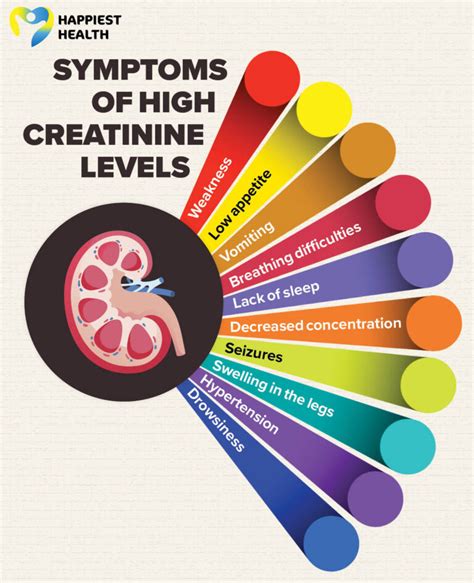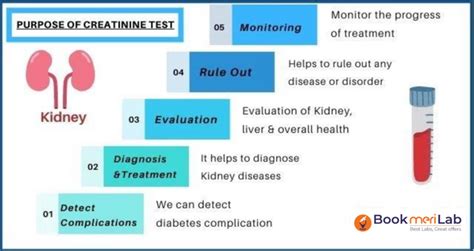Intro
Discover how creatinine impacts blood work results, affecting kidney function, waste removal, and overall health, with 5 key ways it influences lab tests and diagnosis, including renal function, muscle mass, and dehydration factors.
The importance of understanding creatinine levels in blood work cannot be overstated. Creatinine is a waste product that is generated by the normal breakdown of muscle tissue, and it is filtered out of the blood by the kidneys. When kidney function is impaired, creatinine levels can rise, providing a critical indicator of potential health issues. For individuals undergoing medical testing, knowing how creatinine affects blood work is essential for interpreting results accurately. This knowledge enables healthcare providers to diagnose and manage kidney disease, as well as other conditions that may impact kidney function.
Creatinine levels are a key component of blood work, particularly in tests designed to assess kidney function. The kidneys play a vital role in filtering waste from the blood, and creatinine is one of the primary waste products that they remove. By measuring creatinine levels, healthcare providers can gain insights into how well the kidneys are performing their filtering function. This information is crucial for detecting kidney disease, monitoring its progression, and evaluating the effectiveness of treatments. Moreover, understanding the impact of creatinine on blood work can help individuals take proactive steps to protect their kidney health, such as maintaining a healthy diet, staying hydrated, and managing conditions like diabetes and high blood pressure that can affect kidney function.
The relationship between creatinine and blood work is complex, involving various factors that can influence creatinine levels. For instance, muscle mass, age, and sex can all impact creatinine levels, as can certain medications and dietary factors. Furthermore, creatinine levels can fluctuate due to temporary conditions such as dehydration or severe illness. Therefore, interpreting creatinine levels in the context of overall health and other blood work results is essential for an accurate diagnosis and effective treatment plan. By exploring the different ways creatinine affects blood work, individuals can better understand their test results and work closely with their healthcare providers to maintain optimal kidney health.
Understanding Creatinine and Its Role in Blood Work

Factors Influencing Creatinine Levels
Several factors can influence creatinine levels, including muscle mass, age, sex, and certain medications. For example, individuals with more muscle mass may have higher creatinine levels due to the increased breakdown of muscle tissue. Similarly, older adults may experience a decline in kidney function, leading to higher creatinine levels. Understanding these factors is essential for accurately interpreting creatinine levels in the context of blood work.The Impact of Creatinine on Kidney Function Tests

Interpreting Creatinine Levels in Blood Work
Interpreting creatinine levels in blood work requires careful consideration of various factors, including the individual's medical history, physical condition, and other test results. For instance, a mildly elevated creatinine level may not be a cause for concern in an otherwise healthy individual, but it could indicate a problem in someone with a history of kidney disease. Healthcare providers use creatinine levels in conjunction with other tests, such as urine tests and imaging studies, to diagnose and manage kidney disease effectively.Creatinine and Its Relationship to Other Health Conditions

Managing Creatinine Levels and Kidney Health
Managing creatinine levels and kidney health involves a combination of lifestyle modifications, medical treatments, and regular monitoring. Individuals can help maintain healthy kidneys by staying hydrated, following a balanced diet, exercising regularly, and managing underlying health conditions. Healthcare providers may also recommend medications or other treatments to slow the progression of kidney disease and reduce creatinine levels. By working together, individuals and their healthcare providers can develop effective strategies for managing kidney health and preventing complications.The Importance of Regular Blood Work and Creatinine Monitoring

Benefits of Early Detection and Treatment
The benefits of early detection and treatment of kidney disease are numerous, including improved treatment outcomes, reduced risk of complications, and enhanced quality of life. By monitoring creatinine levels and other indicators of kidney function, healthcare providers can identify kidney disease in its early stages, when it is more easily treatable. This enables individuals to take proactive steps to manage their condition, slow disease progression, and maintain optimal kidney health.Conclusion and Future Directions

Final Thoughts
In final thoughts, the relationship between creatinine and blood work is complex and multifaceted, involving various factors that can influence creatinine levels. By staying informed about the latest developments in kidney health and creatinine monitoring, individuals can take proactive steps to protect their kidneys and prevent complications. Whether through lifestyle modifications, medical treatments, or regular monitoring, managing creatinine levels and kidney health is essential for maintaining overall well-being.What is creatinine, and why is it important in blood work?
+Creatinine is a waste product that comes from the normal wear and tear on muscles of the body, and it is filtered out of the blood by the kidneys. It is an important indicator of kidney function, and elevated levels can signal kidney disease or other health issues.
How do I know if my creatinine levels are normal or elevated?
+Creatinine levels are typically considered normal if they fall within a certain range, which can vary depending on the laboratory and the individual's age, sex, and body size. Your healthcare provider can help interpret your creatinine levels and determine if they are normal or elevated.
Can I take steps to lower my creatinine levels and improve kidney health?
+Yes, there are several steps you can take to help lower your creatinine levels and improve kidney health, including staying hydrated, following a balanced diet, exercising regularly, and managing underlying health conditions. Your healthcare provider can help develop a personalized plan to support your kidney health.
We invite you to share your thoughts and questions about creatinine and its impact on blood work. Whether you have personal experience with kidney disease or are simply looking to learn more about maintaining optimal kidney health, your feedback and insights are valuable to us. Please feel free to comment below, share this article with others, or reach out to us directly to continue the conversation. By working together, we can promote greater awareness and understanding of kidney health and the importance of creatinine monitoring.
